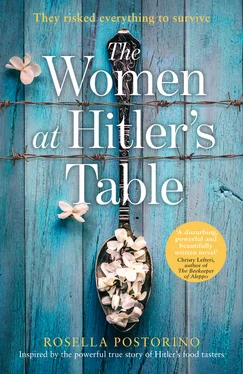In the lunchroom in Krausendorf the baseboards were all intact. Gregor wasn’t there, I was alone. The SS guards’ boots dictated the pace of the meal, clicking away the countdown to our potential death. This asparagus is delicious, but isn’t poison bitter? I swallowed and my heart stopped.
Elfriede was also eating asparagus, staring at me as she did, and I drank one glass of water after another to dilute my anxiety. It might have been my dress that made her so curious. Maybe Herta was right, maybe I was out of place wearing that checkered pattern, it wasn’t like I was going to the office, I didn’t work in Berlin anymore. Get rid of those city airs of yours, my mother-in-law had told me, otherwise everyone’s going to look down on you . Elfriede wasn’t looking down on me, or maybe she was, but I had put on my most comfortable dress, the one most worn—the uniform, Gregor used to call it. It was the one I never had to question, neither if it flattered my figure, nor if it would bring me luck. It offered me shelter, even from Elfriede, who was scrutinizing me with a serious look on her face and didn’t even bother to hide it, her eyes scouring the checks on my dress with enough vehemence to make them fly off the fabric, with enough vehemence to unravel the hem, unlace my heeled shoes, make the wave of hair that framed my temple fall flat as I continued to drink water.
Lunch wasn’t over yet and I didn’t know if we were permitted to leave the table. My bladder ached, like it had in the cellar in Budengasse where Mother and I would seek refuge at night with the building’s other tenants when the air-raid sirens went off. But there was no bucket in the corner here, and I couldn’t hold it any longer. Without even consciously deciding to, I stood up and asked permission to go to the washroom. The SS guards nodded. As one of them, a very tall man with big feet, escorted me into the hallway, I heard Elfriede’s voice. “I need to go too.”
The tiles were worn, the grout blackened. Two sinks and four stalls. The SS man stood guard in the hallway, we went in, and I hurried into one of the stalls. I didn’t hear another stall door close or a faucet run. Elfriede had disappeared, or was standing there listening. The sound of my stream breaking the silence was humiliating. When I opened the door she blocked it with the tip of her shoe, grabbed me by the shoulder, and shoved me back against the wall. The tiles smelled of disinfectant. She moved her face close to mine, almost sweetly.
“What do you want?” she said.
“Me?”
“Why were you staring at me during the blood sample?”
I tried to break free. She blocked my way.
“A word of advice: mind your own business. In this place, everybody’s better off minding their own business.”
“I can’t stand the sight of my own blood, that’s all.”
“Oh, but the sight of someone else’s blood is okay, is it?”
The scrape of metal against wood made us start. Elfriede pulled away.
“What are you up to in here?” the guard asked, stepping inside. The tiles were cold and damp, or maybe it was the sweat on my back. “Having a little tête-à-tête, are we?” He wore enormous shoes, perfect for crushing the heads of snakes.
“I had a dizzy spell. It must be because of the blood sample,” I stammered, touching the red mark over the bulging vein on the inside of my elbow. “She was helping me. I feel better now.”
The guard warned that if he caught us like that again, so intimate, he would teach us a lesson. Or better yet, he would take advantage of it. Then he burst out laughing.
We went back to the lunchroom, the Beanpole watching our every step. He was wrong: it hadn’t been intimacy between Elfriede and me, it had been fear. We were sizing up each other and our surroundings with the blind terror of someone who’s just been born into the world.
That night, in the bathroom of the Sauer home, the scent of asparagus that emanated from my urine made me think of Elfriede. She too, sitting on the commode, probably smelled the same odor. Even Hitler, in his bunker at the Wolfsschanze. That night, Hitler’s urine would stink like mine.
4 Contents Cover Title Page THE WOMEN AT HITLER’S TABLE Rosella Postorino Translated from the Italian by Leah Janeczko Copyright Epigraph Part One Chapter 1 Chapter 2 Chapter 3 Chapter 4 Chapter 5 Chapter 6 Chapter 7 Chapter 8 Chapter 9 Chapter 10 Chapter 11 Chapter 12 Part Two Chapter 13 Chapter 14 Chapter 15 Chapter 16 Chapter 17 Chapter 18 Chapter 19 Chapter 20 Chapter 21 Chapter 22 Chapter 23 Chapter 24 Chapter 25 Chapter 26 Chapter 27 Chapter 28 Chapter 29 Chapter 30 Chapter 31 Chapter 32 Chapter 33 Chapter 34 Chapter 35 Chapter 36 Chapter 37 Chapter 38 Chapter 39 Chapter 40 Chapter 41 Chapter 42 Chapter 43 Part Three Chapter 44 Chapter 45 Chapter 46 Chapter 47 Chapter 48 Notes and Acknowledgments About the Publisher
I was born on December 27, 1917, eleven months before the Great War ended, a Christmas gift to wrap up the holiday celebrations. My mother said Santa Claus had heard me wailing, bundled up beneath so many blankets in the back of his sleigh that he’d completely overlooked me. And so he flew back to Berlin, unwillingly though, because his vacation had just begun and the unscheduled delivery was an inconvenience. It’s a good thing he noticed you, Father used to say, because you were our only gift that year.
My father was a railroad worker, my mother a seamstress. Our living room floor was always covered with spools of thread and balls of yarn in all different colors. My mother would lick the end of a strand to thread the needle more easily, and I would mimic her. Once, without letting her see, I sucked a strand of thread and played with it on my tongue. When it had been reduced to a soggy clump, I couldn’t resist the urge to swallow it and discover whether, once inside me, it would kill me. I spent the following minutes wondering what the signs of my imminent death would be, but, given that I didn’t die, I soon forgot about it. Then at night I remembered it, certain my time had come. The game of death began at a very early age. I never spoke a word of it to anyone.
At night my father would listen to the radio while my mother would sweep up the threads strewn on the floor and climb into bed to open a copy of Deutsche Allgemeine Zeitung, eager to read the latest episode of her favorite serial novel. That was my childhood, the steamed-up windows looking out onto Budengasse, multiplication tables memorized well in advance, the walk to school wearing shoes that were first too big and then too tight, ants decapitated with fingernails, Sundays on which Mother and Father would read from the pulpit—she the psalms, he the Epistles to the Corinthians—and I would listen to them from the pew, either proud or bored, a pfennig coin tucked in my mouth. The metal was salty, it tingled. I would close my eyes in delight, my tongue pushing it to the edge of my throat until it teetered there, ready to slide down, then all at once I would spit it out. My childhood was books beneath my pillow, nursery rhymes sung with my father, blind man’s bluff in the square, stollen at Christmas, trips to the Tiergarten, the day I went to Franz’s crib, stuck his tiny hand between my teeth, and bit down hard. My brother howled like all newborns howl when they wake up, and no one found out what I had done.
It was a childhood full of sins and secrets, and I was too focused on their safekeeping to notice anyone else. I never wondered where my parents found the milk, which cost hundreds and later thousands of marks, if they held up a grocery store and eluded the police. Not even years later did I wonder if they felt humiliated by the Treaty of Versailles like everyone else, if they too hated the United States, if they felt unjustly treated for being held responsible for a war in which my father had fought. He had spent an entire night in a foxhole with a dead Frenchman and had eventually dozed off beside the corpse.
Читать дальше












